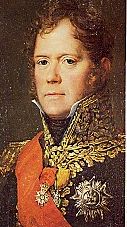On this date in 1815, Napoleonic Marshal Michel Ney faced a squad of French troops un-blindfolded and gave them the last order of his wild career:
Soldiers, when I give the command to fire, fire straight at my heart. Wait for the order. It will be my last to you. I protest against my condemnation. I have fought a hundred battles for France, and not one against her… Soldiers Fire!

 The carrot-topped commander, just seven months Napoleon’s senior, had like the Corsican distinguished himself at arms during the French Revolution.
The carrot-topped commander, just seven months Napoleon’s senior, had like the Corsican distinguished himself at arms during the French Revolution.
He shone thereafter as a ballsy* cavalry officer in the Napoleonic Wars — Bonaparte called him le Brave des Braves (“the bravest of the brave”).
Hitching your star to Napoleon’s was a good career move, for sure.
Until right about …

Michel Ney was named Prince de la Moskowa after the Battle of Borodino 1812. Things kind of went downhill from there.
“[W]e are told of the greatness of soul of the marshals, especially of Ney — a greatness of soul consisting in this: that he … escaped to Orsha abandoning standards, artillery, and nine-tenths of his men.” -Leo Tolstoy, War and Peace
Ney was able to keep things cool with Louis XVIII, but when Napoleon returned from Elba and Ney marched out to capture him, both Marshal and army deserted to the old emperor.
Ney often takes a rap for fouling up the reunion tour with a characteristically reckless cavalry charge during the Battle of Waterloo.
But his real problem was that he couldn’t make up his mind or stir his spirit or just plain read the writing on the wall well enough to get out while the getting was good. Though the Bourbons gave him every opportunity to blow town and spare the new-look ancien regime the embarrassment of having to try him, Ney didn’t do it — causing the king to fume,
By letting himself be caught, he has done us more harm than he did [defecting to Napoleon] on the 13th of March!
A vengeful Chamber of Peers, full of radical more-royalist-than-the-king types, gave him no quarter.
The near-unanimous conviction and death sentence were agreed by the Peers around midnight as December 6 became December 7, and the Bravest of the Brave led out near the Luxembourg Garden that very morning to suffer the sentence passed upon him.

The Bravest of the Brave, a 19th-century general history of the man, is available free on Google Books, as are two volumes of memoirs (1, 2) published posthumously by his family.
French speakers can find other free 19th century texts on Ney linked here.
* His reputation for unshakable courage notwithstanding, John Elting says Ney was also a deft hand at executing a cavalry retreat.
On this day..
- 1900: A day in the death penalty around the world
- 1982: Charles Brooks, Jr., the first by lethal injection
- 1799: Francesco Conforti, regalist and republican
- 1683: Algernon Sidney, republican philosopher
- 1938: Anna Marie Hahn, serial poisoner
- 1323: Jean Persant, a black cat, and the body of Jean Prévost
- 1982: Dos Erres massacre
- 1989: Carlos DeLuna, "I didn't do it. But I know who did."
- 1869: Nicholas Melady, the last public hanging in Canada
- 2008: One man pardoned during hanging
- 1549: Robert Kett, rebelling against enclosures
- 43 B.C.E.: Cicero
